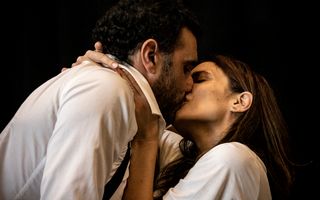Read Artistic Director Peter Evans' program notes for the 2023 production of Macbeth.
Macbeth is Shakespeare meditating on guilt. All the major characters express guilt. Lady Macbeth even has a word play on it in one of the most famous scenes Shakespeare wrote:
If he do bleed,
I’ll guild the faces of the grooms withal,
For it must seem their guilt.
Macbeth’s first stirrings of guilt result in a panic attack at the mere thought of committing murder. It happens in his first soliloquy, the first time Macbeth talks to the audience, confides in us. He is knocked sideways after the Weird Sisters’ first prophecy comes true, and he imagines committing murder in order to achieve the second:
Why do I yield to that suggestion
Whose horrid image doth unfix my hair,
And make my seated heart knock at my ribs,
Against the use of nature?
Lady Macbeth, who is not without feeling or empathy, spends the play seemingly oblivious to guilt, able to compartmentalise:
What’s done is done.
But she eventually has one of the most memorable scenes of guilt in all of western theatre – the sleepwalking scene.
Out, damned spot: out, I say.
Who would have thought the old man to have had so much blood in him?
An amazing piece of writing, just amazing. A poem made up of snatches of lines and scenes from the play we now experience from a different perspective. We retrospectively assess earlier scenes of horror and murder, realising Lady Macbeth was much more vulnerable and frightened than she first appeared.
Then comes one of my favourite passages in Shakespeare, where Macbeth describes his lack of fear and feeling:
I have almost forgot the taste of fears.
The time has been, my senses would have cooled
To hear a night-shriek…
Amazing. And another example of Macbeth’s intense feeling in his ability to describe his new lack of feeling. So very Shakespeare!
Our production is social. We are concerned with the political life of the characters. The play is full of formal language. It is worth noting how important hospitality and the language of graciousness was to the Elizabethans and Jacobeans. Shakespearean tragedies tend to be about the individual blowing up a town, a city, or indeed, a nation.
At a certain point most characters know what the Macbeths have done. A couple of them know immediately. And Shakespeare shows us the politics of grappling with a mad tyrant. Over the last few years and the seemingly endless parade of ‘strongmen’ we have seen here and around the world, I have thought about this play. And not just about Macbeth and his wife, but the characters around him. We have trapped them onstage. Some of you may have seen us explore this with our production of Richard 3. Characters caught in cycles of violence and revenge. Here they are at a perpetual banquet and séance. We are set around 1920, after the destruction of the First World War, with more calamities to come. Spiritualism is popular, a need to reach the dead.
*****
Shakespeare wrote Macbeth in 1606. Seven years earlier, he wrote Julius Caesar, featuring another guilt-ridden murderer – Brutus. The night before killing Caesar, Brutus describes the nightmarish space between thought and action:
Between the acting of a dreadful thing
And the first motion, all the interim is
Like a phantasma, or a hideous dream…
In Hamlet, Shakespeare stretches out that nightmare to fill an entire play. For Macbeth, the space between thought and action gets shorter and shorter, until it disappears entirely:
Be it thought and done.
By filling each moment with action, Macbeth temporarily holds at bay the creeping terror that life has been meaningless. That it has all been for nothing.
A terror that will ultimately overwhelm and consume him.
Peter Evans
Director




